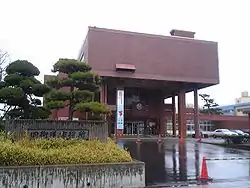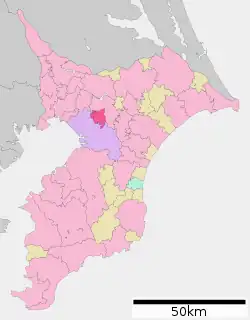Yotsukaidō
Yotsukaidō (四街道市, Yotsukaidō-shi) is a city located in Chiba Prefecture, Japan. As of 1 November 2020, the city had an estimated population of 95,266 in 43,191 households and a population density of 2800 persons per km².[1] The total area of the city is 34.52 square kilometres (13.33 sq mi).
Yotsukaidō
四街道市 | |
|---|---|
 Yotsukaidō City Hall | |
 Flag  Seal | |
 Location of Yotsukaidō in Chiba Prefecture | |
 Yotsukaidō | |
| Coordinates: 35°40′11.2″N 140°10′4.6″E | |
| Country | Japan |
| Region | Kantō |
| Prefecture | Chiba |
| Government | |
| • Mayor | Hitoshi Sado (since February 2010) |
| Area | |
| • Total | 34.52 km2 (13.33 sq mi) |
| Population (December 1, 2020) | |
| • Total | 95,266 |
| • Density | 2,800/km2 (7,100/sq mi) |
| Time zone | UTC+9 (Japan Standard Time) |
| -Tree | Sakura |
| - Flower | Primrose |
| Phone number | 043-421-2111 |
| Address | Shikawatashi, Yotsukaidō-shi, Chiba-ken 284-8555 |
| Website | Official website |
Geography
Located inland on the Shimosa Plateau in north-central part of Chiba Prefecture, Yotsukaidō borders the prefectural capital of Chiba to the south and west. Kashima River in the Tone River system runs north to Lake Inba on the eastern edge of the city.
Neighboring municipalities
Chiba Prefecture
Climate
Yotsukaidō has a humid subtropical climate (Köppen Cfa) characterized by warm summers and cool winters with light to no snowfall. The average annual temperature in Yotsukaidō is 15.0 °C. The average annual rainfall is 1431 mm with September as the wettest month. The temperatures are highest on average in August, at around 26.4 °C, and lowest in January, at around 4.7 °C.[2]
Demographics
Per Japanese census data,[3] the population of Yotsukaidō has grown rapidly over the past 60 years.
| Year | Pop. | ±% |
|---|---|---|
| 1960 | 16,623 | — |
| 1970 | 26,375 | +58.7% |
| 1980 | 59,236 | +124.6% |
| 1990 | 72,157 | +21.8% |
| 2000 | 82,552 | +14.4% |
| 2010 | 86,726 | +5.1% |
| 2020 | 93,576 | +7.9% |
History
Yotsukaidō was inhabited by the Mononobe clan in ancient Japan, from whose name the Monoi region of the city is derived. In the Heian and Kamakura periods, it was under the control of shōen ruled by the Chiba clan for over 600 years. During the Edo period, portions were ruled by the Sakura Domain, and portions were tenryō under the direct control of the Tokugawa shogunate . After the Meiji Restoration, the villages of Chiyoda and Asahi were founded on April 1, 1889 within Inba District, Chiba Prefecture with the creation of them modern municipalities system. However, much of the area of these villages was already under the control of the Imperial Japanese Army, which had established a field artillery training school in 1886. The artillery school remained an active military installation until 1945. Chiyoda was elevated to town status on December 23, 1940, and merged with Asahi Village on March 10, 1955 to form Yotsukaidō Town. Yotsukaidō was elevated to city status on April 1, 1981. Proposals to merge the city into neighboring Chiba were rejected by public referendum in 2003 and 2004.
Government
Yotsukaidō has a mayor-council form of government with a directly elected mayor and a unicameral city council of 20 members. Yotsukaidō contributes two members to the Chiba Prefectural Assembly. In terms of national politics, the city is part of Chiba 9th district of the lower house of the Diet of Japan.
Economy
Yotsukaidō is a regional commercial center and a bedroom community for nearby Chiba and Tokyo. The largest industry within the city borders is a large food processing facility operated by Yakult.
Education
- Aikoku Gakuen University
- Yotsukaidō has 12 public elementary schools and five public middle schools operated by the city government, and two public high schools operated by the Chiba Prefectural Board of Education. There are also two private high schools. The prefecture also operates two special education school for the handicapped.
Public high schools:
- Chiba Prefectural Yotsukaidō High School (千葉県立四街道高等学校)
- Chiba Prefectural Yotsukaidō North High School (千葉県立四街道北高等学校)
Private high schools:
- Chiba Keiai Senior High School
- Aikoku Gakuen Yotsukaidō High School (愛国学園大学附属四街道高等学校)
Transportation
Notable people
- Kazuo Shii, Japan Communist Party chairman
- Yusuke Kobori, professional boxer
- Kodai Watanabe, professional soccer player
Sister city relations
 – Livermore, California, United States, from April 19, 1977
– Livermore, California, United States, from April 19, 1977
References
- "Yotsukaidō city official statistics" (in Japanese). Japan.
- Yotsukaidō climate data
- Yotsukaidō population statistics
External links
- Official Website (in Japanese)